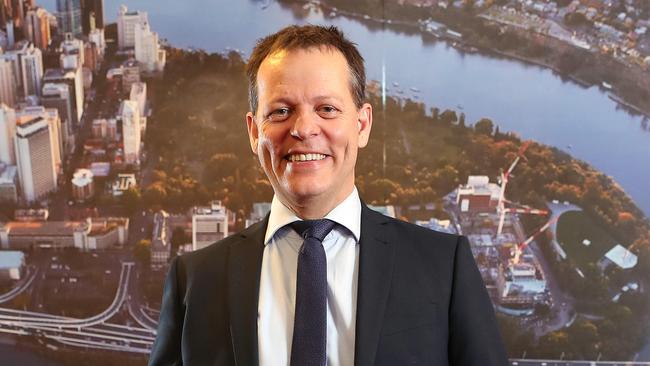Done right, the Olympics will transform region’s infrastructure
The 2032 Olympic Games can be the catalyst to deliver enhanced public transport and infrastructure for our booming region, Scott Smith writes.
QLD News
Don't miss out on the headlines from QLD News. Followed categories will be added to My News.
Now, more than ever, communities are feeling the pressures of growth which are impacting housing, cost of living and congestion across our major transport networks.
With record population growth and the region’s major road corridors forecast to be over capacity within a decade, our region has some big challenges ahead of it.
Despite being the fastest growing region in Australia, SEQ has struggled to secure the focus and catalytic investment afforded to the Melbourne and Sydney regions.
Securing the Brisbane 2032 Olympic and Paralympic Games was a big, bold and ambitious play from SEQ Mayors, ultimately supported by leaders across government and industry, and all sides of politics, to change this.

At the time the bid was backed by three in four residents who said they would only support it if it accelerated major upgrades to the transport infrastructure our growing region needs.
It’s why Brisbane’s Games bid included significant planning and feasibility work to match the benefits of the Games to the growth of the South East.
And a key reason the Games will be held in venues across SEQ, 85 per cent of which already exist or were already planned to be delivered in the future, regardless of the Games.
But the focus now has to urgently shift to the infrastructure we need to make this happen.
The SEQ Mayors have a vision for a fast, accessible and reliable regional public transport network capable of rivalling other world-class Olympic regions.
Public transport that connects growing communities, busts congestion and unlocks housing supply, and protects the long-term liveability and affordability of our region as it grows.
But since securing Brisbane 2032, it feels like government has lost sight of this commitment with an unnecessary focus on stadium upgrades that are not a direct Games cost.
That’s why it’s been pleasing to see a refreshed infrastructure focus by Queensland Premier Steven Miles and Opposition Leader David Crisafulli, including the establishment of an independent infrastructure authority – something the SEQ Mayors had always called for.
As SEQ prepares to accommodate another 2.2 million residents in the next 20 years, now is the time to refocus efforts to ensure we deliver the generational infrastructure Queensland needs – infrastructure that has a positive impact on cost of living and housing pressures across our region.
The Games can help to do this. Done right, it can be the catalyst to deliver new and enhanced public transport and infrastructure needed to support long-term population and economic growth, sooner and in time for 2032.
At the same time, the Games will deliver significant long-term benefit and economic returns for governments which has already been estimated at more than $17 billion nationally. This includes a multibillion-dollar economic boost for trade, tourism as well as social improvements to public health and widespread community benefits.
With little more than eight years to go, time is quickly running out to recalibrate our Games journey and ensure we focus our efforts on delivering the lasting infrastructure and transport benefits communities clearly expect.
Scott Smith is chief executive officer, Council of Mayors Southeast Queensland.




